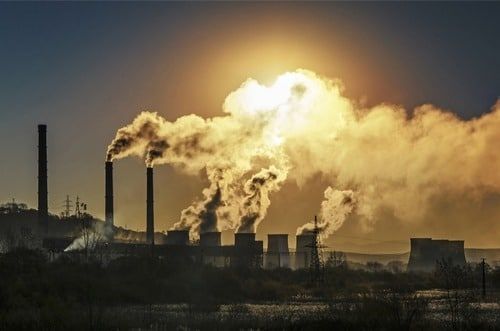Suing oil companies to pay for climate change?
By Seth Shulman | October 5, 2017

With estimates of the damage from the recent hurricanes in the United States now running into the hundreds of billions of dollars and coastal communities confronting the need for mitigation projects to address the rise in sea levels caused by climate change, more people are recognizing the burden that climate change poses to taxpayers. In New York City alone, officials estimate that climate-related adaptation measures—such as infrastructure made resilient to extreme weather, and roads built to withstand “rain bombs”—will cost more than $19 billion, say studies such as A Stronger, More Resilient New York. Globally, cost projections are astronomical: The UN Environment Programme calculates that adapting to changes in climate will cost developing countries $140 billion to $300 billion per year in 2030.
Given the scale of these costs, many observers are asking what responsibility the major fossil fuel companies should bear—especially given that their own internal company documents show that some of these companies knew for decades about the harm their products were causing to the climate and yet continued to spend millions misleading the public and blocking climate action. In so doing, many have noted that their actions echo those of the tobacco companies’ similar, decades-long campaign of denying their own scientific evidence of the harmful effects of smoking cigarettes.
A new peer-reviewed study published in the journal Climatic Change sheds new light on fossil fuel producers’ liability. While previous research had shown that a relative handful of companies were responsible for more than 60 percent of greenhouse gases, the authors of the new study succeeded in tracing specific climate damages—including increased temperatures and sea level rise—to the products sold by individual companies such as Chevron and ExxonMobil.
Brenda Ekwurzel, the study’s lead author and climate science director at the Union of Concerned Scientists (where I also work) explained: “We’ve known for a long time that fossil fuels are the largest contributor to climate change. What’s new here is that we’ve determined just how much specific companies’ products have caused the earth to warm and the seas to rise.”
Pinpointing companies’ impacts. The team, which included scientists from Oxford University and North Carolina State University, looked at the largest oil, gas, and coal producers and cement manufacturers, using sophisticated computer analyses to quantify the amount of sea level rise and global temperature increase attributable to carbon dioxide and methane emitted during the extraction, production, and use of these companies’ products. The findings are striking.
According to the study, emissions traced to the 90 largest carbon producers contributed nearly 50 percent of the rise in global average temperature and around 30 percent of global sea level rise since 1880. It also found that emissions traced to the 50 investor-owned carbon producers (including BP, Chevron, ConocoPhillips, ExxonMobil, Peabody, Shell, and Total) contributed around 16 percent of the global average temperature increase from 1880 to 2010, and around 11 percent of global sea level rise over that period. Finally, the study showed that the emissions traced to these same 50 companies from just 1980 to 2010—a period during which fossil fuel companies were indisputably aware their products were causing global warming—contributed about 10 percent of the global average temperature increase and roughly 4 percent of global sea level rise.
Implications for the courtroom. This research, part of an emerging field known as climate attribution science, offers a powerful tool that could potentially help courts resolve the vexing problem of how to apportion responsibility for damages caused by climate change—possibly even damages sustained in an extreme weather event.
For example, after Hurricane Sandy slammed into the East Coast in 2012, scientists determined that climate-driven sea level rise significantly magnified Sandy’s flood damage to property in New York City. According to these findings, the higher sea level caused by climate change caused some $2 billion in additional damages to the city over what it would have sustained otherwise. The latest research by Ekwurzel and her team suggests that climate scientists could further pinpoint a particular company’s share of that damage.
Several lawsuits are likely to put this kind of scientific research to the test in the courtroom. In one case now underway, three California communities—Marin and San Mateo Counties, and the city of Imperial Beach—are suing 37 oil, gas, and coal companies for climate-related damages to public property such as beaches and parks, and the possibility that some residents of these communities will lose their property and be displaced. (The full legal complaints from these California communities and other supporting material are available online.) These communities are seeking recompense for costs already incurred as well as for anticipated costs to address the ongoing threat. Arguing that these companies knowingly misled the public, the communities are also seeking punitive damages for the alleged wrongdoing. Even more recently, the cities of San Francisco and Oakland, California brought separate lawsuits of their own against five major fossil fuel companies for climate-related damages.
With legal verdicts in these cases likely years away, it is too early to predict their outcome. But it is easy to see how climate scientists’ growing ability to apportion responsibility for climate damages could play a role in potential court rulings. Others have previously tried suing the oil companies for damages arising from sea level rise—such as a failed 2008 lawsuit against BP and Chevron by a small native Alaskan island community. But lawyers outside these cases who have been observing them say that things look different this time around. Speaking of the Marin lawsuit, for example, Sophie Marjanac of the legal advocacy group Client Earth told The Guardian: “This claim has a better chance. We have better climate science now.”
The simple fact is that climate attribution science has advanced significantly in recent years. In addition, more information has surfaced about just how much the major fossil fuel companies knew—decades ago—about the dangers their products posed to the planet. And there is more information about the efforts of companies such as ExxonMobil to actively mislead the public about climate science. More such information could also become public, given a recent court ruling by the New York State Supreme Court that ExxonMobil must hand over internal company documents in an investigation now underway by New York Attorney General Eric Schneiderman.
Testing public trust. Meanwhile, another ongoing lawsuit is taking a notably different tack. In this case—Juliana vs US—initially filed in 2015, a group of children acting as trustees for future generations (in conjunction with a youth activist group and climate scientist James Hanson) have sued the United States government and a variety of federal agencies, alleging that they have failed to regulate carbon dioxide emissions from major sources such as power plants and vehicles over the past 50 years, despite knowing about the threat posed by climate change. The plaintiffs claim that the government has violated their constitutional right to a sustainable climate system, a right they say is grounded in the constitutional right to life and liberty. These plaintiffs also allege that the government has violated the so-called “public trust doctrine”—an ancient principle originating in Roman law that a sovereign government must hold common natural resources in trust and must preserve them for future generations. To redress the situation, these plaintiffs seek a court order to require the government to implement an enforceable national plan to phase out fossil fuel emissions to stabilize the climate system.
Most legal observers viewed this case as a long shot. But in 2016, a surprisingly forceful ruling in federal district court held that the plaintiffs do have legal standing to bring the case, and that there may well be a constitutional right to a stable climate system. Furthermore, the court ruled that the public doctrine does potentially require the government to act as a responsible steward of the oceans, if not the earth’s atmosphere, and that the judicial branch does not have to sit on the sidelines in deference to the legislative and executive branches.
Still, many hurdles remain for this lawsuit. The Trump administration has attempted to short-circuit the trial scheduled for February by filing a premature appeal, and that request is pending. Even if that gambit fails, the plaintiffs would be required at trial to prove allegations that the court so far assumed to be true.
An even more vexing problem is what a judicial order to remedy the problem might look like. The plaintiffs seek a court order requiring the US government to ensure a stable climate system—but climate change, of course, is a global problem caused by many foreign states and companies, and the court has no authority over any of them. Consequently, the court will have to assign some proportional percentage of responsibility to the United States government. Here again, it is conceivable that climate attribution science could play a supporting role.
As the latest research shows, the field of climate attribution science is advancing rapidly and scientists are increasingly able to quantify climate damages from particular sources. A debate certainly looms over the scientific techniques used and the accuracy of these findings, not to mention their viability in court. Still, such research is undeniably sparking a long-overdue public conversation—in the courts, and in some policy circles—about the legal responsibility of fossil fuel companies for the climate damages caused by emissions from their products.
Together, we make the world safer.
The Bulletin elevates expert voices above the noise. But as an independent nonprofit organization, our operations depend on the support of readers like you. Help us continue to deliver quality journalism that holds leaders accountable. Your support of our work at any level is important. In return, we promise our coverage will be understandable, influential, vigilant, solution-oriented, and fair-minded. Together we can make a difference.
Topics: Analysis, Climate Change















